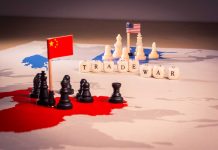
It looks like Uncle Sam is about to throw a wrench in the gears of the Chinese autonomous vehicle makers. You might be thinking, “What’s the big deal? It’s just some fancy computer code in cars, right?” Wrong! This isn’t about your grandpa’s Oldsmobile; we’re talking about rolling supercomputers that could be collecting data on everything from your daily commute to your favorite drive-thru order. So buckle up, patriots, because we’re about to take a wild ride through the world of high-tech automotive espionage and good old-fashioned American protectionism.
The Great Firewall of America
The U.S. Commerce Department is gearing up to propose a ban on Chinese software in autonomous and connected vehicles with Level 3 automation and above. This isn’t just about keeping Chinese tech out of our cars; it’s about protecting national security and preserving American dominance in the automotive industry.
The proposed ban would prevent testing of autonomous vehicles produced by Chinese companies on U.S. roads and bar vehicles with Chinese-developed advanced wireless communications modules. This move is aimed at addressing concerns about data collection and potential security risks associated with Chinese technology in connected vehicles.
The US may propose barring Chinese software in autonomous vehicles in the coming weeks due to security concerns, according to Reuters https://t.co/26QavAwNBr
— Bloomberg Markets (@markets) August 5, 2024
Verifying the Supply Chain
Under the proposed rules, automakers and suppliers would need to verify that their software is not developed by any “foreign entity of concern,” including China. This requirement would force companies to scrutinize their supply chains and potentially find alternative sources for software and components.
“The Commerce Department said last month it planned to issue proposed rules on connected vehicles in August and expected to impose limits on some software made in China and other countries deemed adversaries,” Reuters reported.
The proposed rules are expected to focus on specific systems within vehicles that are of particular concern. This targeted approach may help mitigate potential disruptions to the industry while addressing key security risks.
National Security Concerns
The Commerce Department cites national security risks as the primary motivation for the proposed rules. Officials are particularly worried about the potential for connected vehicles to be used for surveillance or even remote control by foreign entities.
Back in May, Commerce Secretary Gina Raimondo said, “The national security risks are quite significant. We decided to take action because this is really serious stuff.”
Chinese AV companies already test-drove more than 450,000 miles in California alone in the 12 months ending November 2022. This extensive testing has raised alarms about the potential for data collection and analysis by foreign entities.
Economic Implications
While the proposed ban is primarily focused on national security, it could have significant economic implications for both U.S. and Chinese companies. American automakers and suppliers may need to invest in developing their own software or sourcing it from non-Chinese providers, potentially increasing costs and development times.
Chinese companies, on the other hand, could be effectively locked out of a major market for autonomous vehicle technology. This could hinder their ability to compete globally and potentially slow the overall pace of innovation in the industry.
As the U.S. government moves forward with these proposed rules, it’s clear that the intersection of technology, national security, and economic interests will continue to shape the future of the autonomous vehicle industry. American companies and consumers alike will need to navigate this changing landscape carefully to ensure both safety and innovation in the years to come.
Sources
- US expected to propose barring Chinese software in autonomous vehicles
- Biden Administration Targets Chinese Tech in Autonomous Cars with Proposed Ban
More from Around the Web
More information about self-driving Chinese vehicles:














